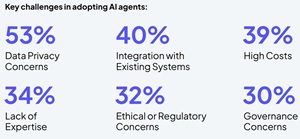Cloudera Research Highlights Data Privacy as Key Hurdle in AI Agent Adoption
A new Cloudera report reveals that while organizations are eager to integrate AI agents into their operations, data privacy concerns remain the top barrier to widespread adoption.
A new report from Cloudera underscores the challenges organizations face as they scale up AI agent deployments, with data privacy emerging as the primary obstacle. The study, titled "The Future of Enterprise AI Agents", surveyed 1,484 IT leaders across 14 countries and found that 53% rank data privacy as their top concern, followed by integration complexity (40%) and high costs (39%).
Key Findings
- AI Agents Gain Momentum: 57% of organizations began implementing AI agents in the past two years, with 21% starting in the last year alone.
- Expansion Plans: 96% of respondents plan to expand AI agent use in the next 12 months.
- Top Use Cases: Customer support, process automation, and predictive analytics lead early adoption efforts.
Adoption Barriers
- Integration Complexity (40%): Legacy systems and hybrid cloud environments pose challenges.
- High Costs (39%): Scaling requires significant investment in infrastructure and talent.
- Lack of Expertise (34%): Shortage of skilled professionals hinders deployment.
- Ethical Concerns (32%): Bias and compliance risks remain unresolved.
Recommendations
- Modernize Data Architecture: Unify platforms to ensure privacy and compliance.
- Start Small: Pilot AI agents in low-risk, high-impact areas like customer service.
- Governance Frameworks: Establish accountability and audit mechanisms early.
The report emphasizes that 2025 is a tipping point for AI agent adoption, driven by cloud-native architectures and open-source LLMs. For full insights, access the report here.
Related News
AWS extends Bedrock AgentCore Gateway to unify MCP servers for AI agents
AWS announces expanded Amazon Bedrock AgentCore Gateway support for MCP servers, enabling centralized management of AI agent tools across organizations.
CEOs Must Prioritize AI Investment Amid Rapid Change
Forward-thinking CEOs are focusing on AI investment, agile operations, and strategic growth to navigate disruption and lead competitively.
About the Author

David Chen
AI Startup Analyst
Senior analyst focusing on AI startup ecosystem with 11 years of venture capital and startup analysis experience. Former member of Sequoia Capital AI investment team, now independent analyst writing AI startup and investment analysis articles for Forbes, Harvard Business Review and other publications.

